表示 x 、 ymin 和 ymax 定義的垂直間隔的各種方式。每個案例繪製一個圖形對象。
用法
geom_crossbar(
mapping = NULL,
data = NULL,
stat = "identity",
position = "identity",
...,
fatten = 2.5,
na.rm = FALSE,
orientation = NA,
show.legend = NA,
inherit.aes = TRUE
)
geom_errorbar(
mapping = NULL,
data = NULL,
stat = "identity",
position = "identity",
...,
na.rm = FALSE,
orientation = NA,
show.legend = NA,
inherit.aes = TRUE
)
geom_linerange(
mapping = NULL,
data = NULL,
stat = "identity",
position = "identity",
...,
na.rm = FALSE,
orientation = NA,
show.legend = NA,
inherit.aes = TRUE
)
geom_pointrange(
mapping = NULL,
data = NULL,
stat = "identity",
position = "identity",
...,
fatten = 4,
na.rm = FALSE,
orientation = NA,
show.legend = NA,
inherit.aes = TRUE
)參數
- mapping
-
由
aes()創建的一組美學映射。如果指定且inherit.aes = TRUE(默認),它將與繪圖頂層的默認映射組合。如果沒有繪圖映射,則必須提供mapping。 - data
-
該層要顯示的數據。有以下三種選擇:
如果默認為
NULL,則數據繼承自ggplot()調用中指定的繪圖數據。data.frame或其他對象將覆蓋繪圖數據。所有對象都將被強化以生成 DataFrame 。請參閱fortify()將為其創建變量。將使用單個參數(繪圖數據)調用
function。返回值必須是data.frame,並將用作圖層數據。可以從formula創建function(例如~ head(.x, 10))。 - stat
-
用於該層數據的統計變換,可以作為
ggprotoGeom子類,也可以作為命名去掉stat_前綴的統計數據的字符串(例如"count"而不是"stat_count") - position
-
位置調整,可以是命名調整的字符串(例如
"jitter"使用position_jitter),也可以是調用位置調整函數的結果。如果需要更改調整設置,請使用後者。 - ...
-
其他參數傳遞給
layer()。這些通常是美學,用於將美學設置為固定值,例如colour = "red"或size = 3。它們也可能是配對的 geom/stat 的參數。 - fatten
-
用於增加
geom_crossbar()中的中間條和geom_pointrange()中的中點的大小的乘法因子。 - na.rm
-
如果
FALSE,則默認缺失值將被刪除並帶有警告。如果TRUE,缺失值將被靜默刪除。 - orientation
-
層的方向。默認值 (
NA) 自動根據美學映射確定方向。萬一失敗,可以通過將orientation設置為"x"或"y"來顯式給出。有關更多詳細信息,請參閱方向部分。 - show.legend
-
合乎邏輯的。該層是否應該包含在圖例中?
NA(默認值)包括是否映射了任何美學。FALSE從不包含,而TRUE始終包含。它也可以是一個命名的邏輯向量,以精細地選擇要顯示的美學。 - inherit.aes
-
如果
FALSE,則覆蓋默認美學,而不是與它們組合。這對於定義數據和美觀的輔助函數最有用,並且不應繼承默認繪圖規範的行為,例如borders()。
方向
該幾何體以不同的方式對待每個軸,因此可以有兩個方向。通常,方向很容易從給定映射和使用的位置比例類型的組合中推斷出來。因此,ggplot2 默認情況下會嘗試猜測圖層應具有哪個方向。在極少數情況下,方向不明確,猜測可能會失敗。在這種情況下,可以直接使用 orientation 參數指定方向,該參數可以是 "x" 或 "y" 。該值給出了幾何圖形應沿著的軸,"x" 是您期望的幾何圖形的默認方向。
美學
geom_linerange() 理解以下美學(所需的美學以粗體顯示):
-
x或者y -
ymin或者xmin -
ymax或者xmax -
alpha -
colour -
group -
linetype -
linewidth
請注意,geom_pointrange() 也可以理解size 的點大小。
在 vignette("ggplot2-specs") 中了解有關設置這些美學的更多信息。
也可以看看
stat_summary() 用於這些家夥的使用示例,geom_smooth() 用於連續模擬,geom_errorbarh() 用於水平誤差條。
例子
# Create a simple example dataset
df <- data.frame(
trt = factor(c(1, 1, 2, 2)),
resp = c(1, 5, 3, 4),
group = factor(c(1, 2, 1, 2)),
upper = c(1.1, 5.3, 3.3, 4.2),
lower = c(0.8, 4.6, 2.4, 3.6)
)
p <- ggplot(df, aes(trt, resp, colour = group))
p + geom_linerange(aes(ymin = lower, ymax = upper))
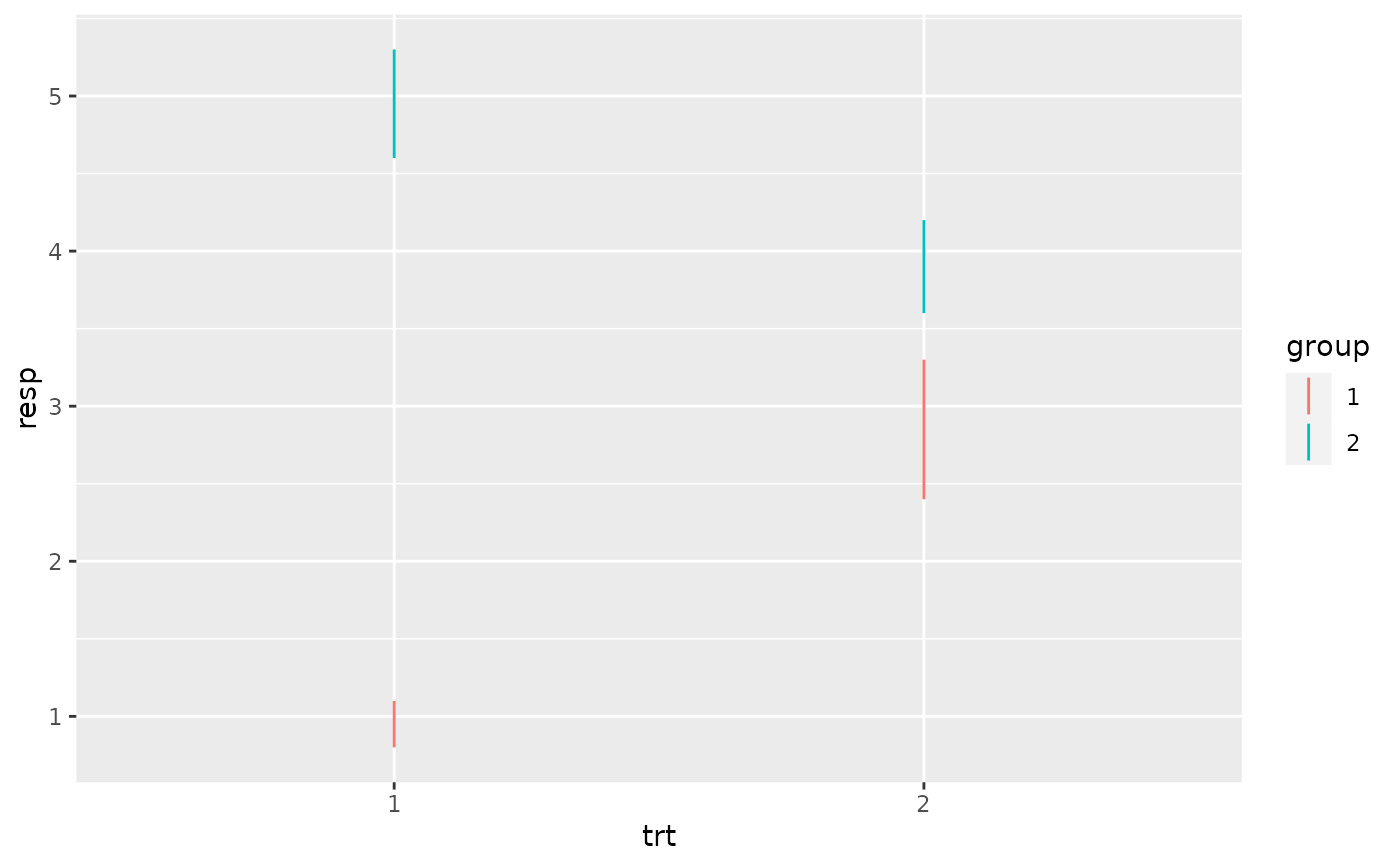 p + geom_pointrange(aes(ymin = lower, ymax = upper))
p + geom_pointrange(aes(ymin = lower, ymax = upper))
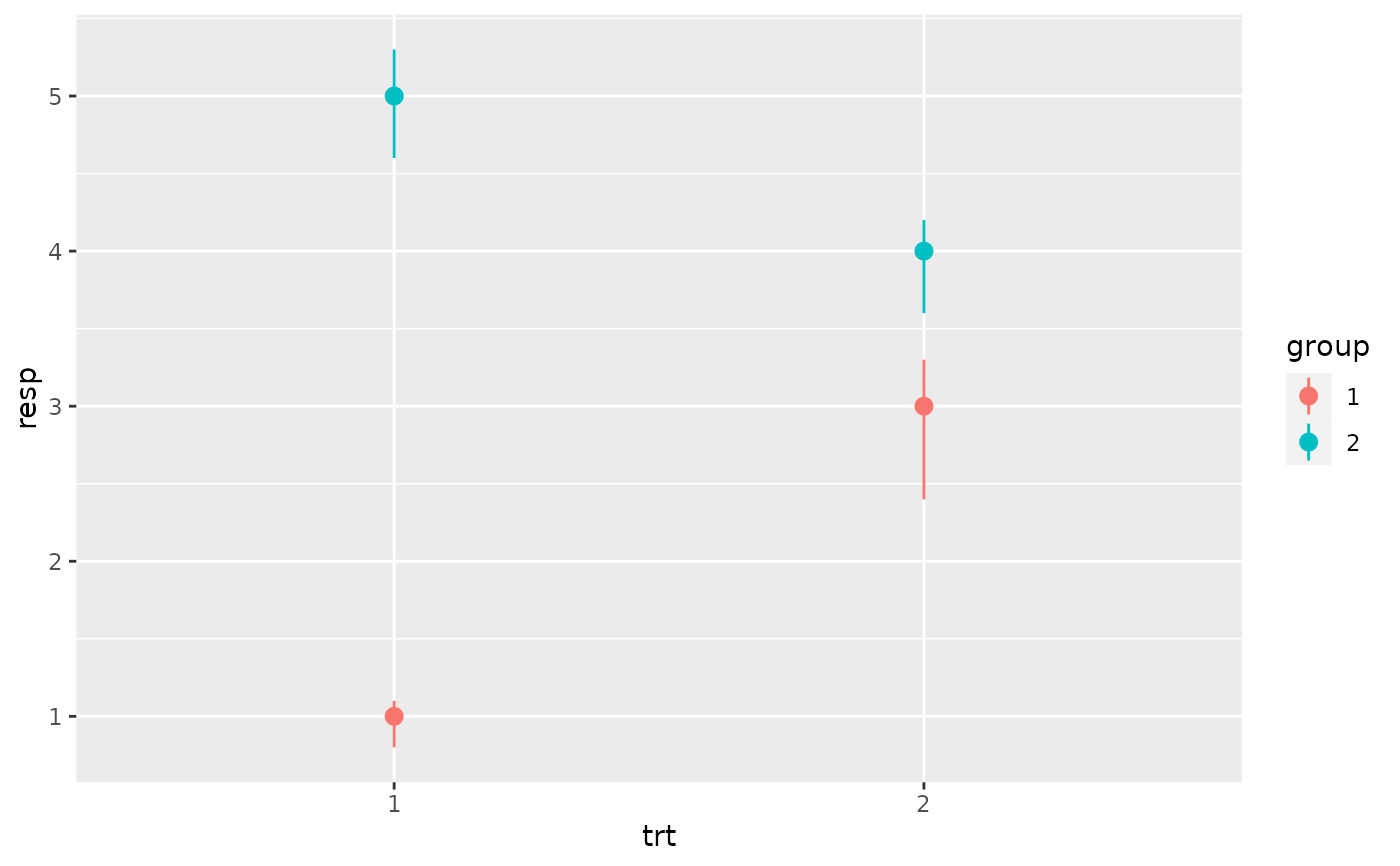 p + geom_crossbar(aes(ymin = lower, ymax = upper), width = 0.2)
p + geom_crossbar(aes(ymin = lower, ymax = upper), width = 0.2)
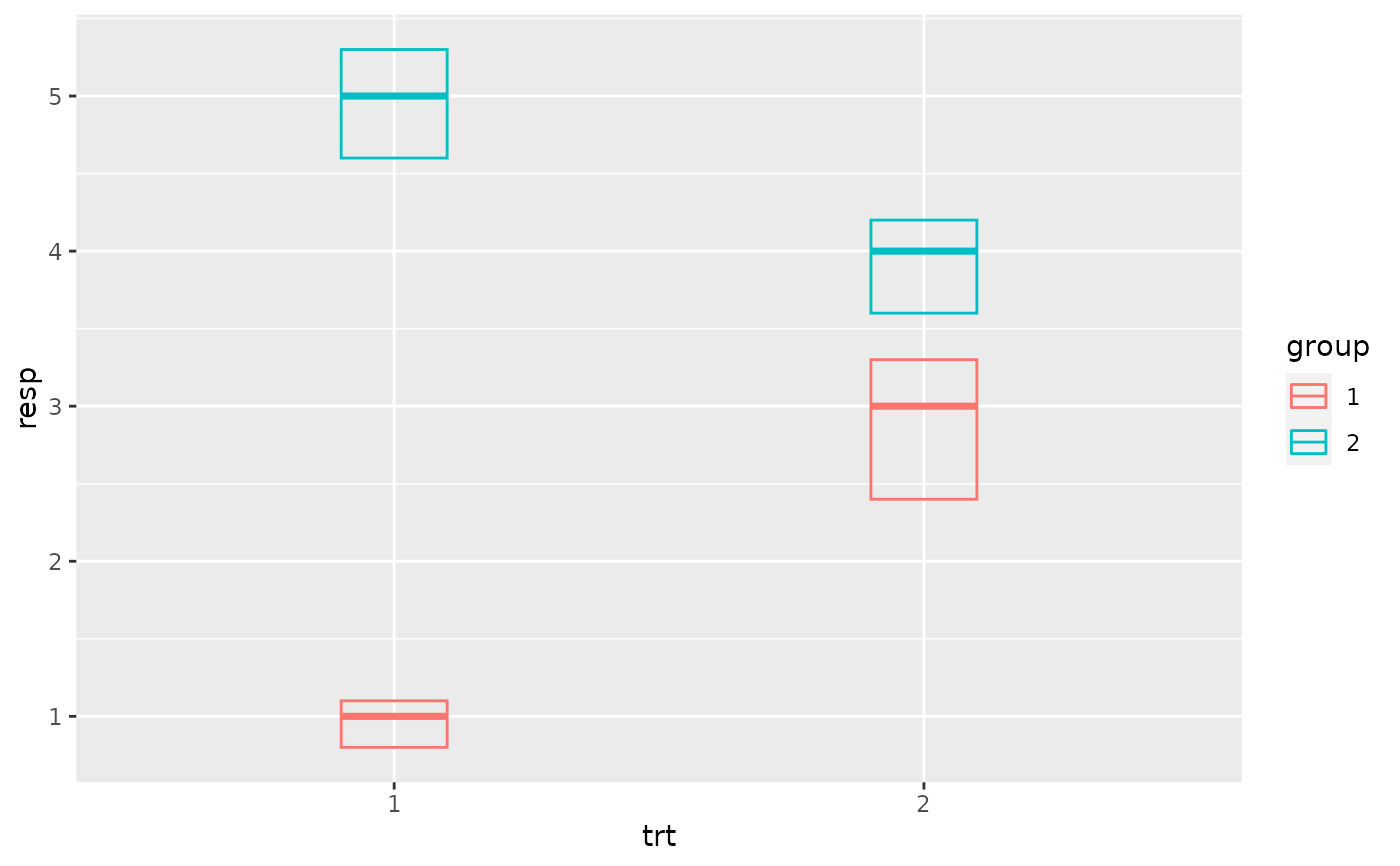 p + geom_errorbar(aes(ymin = lower, ymax = upper), width = 0.2)
p + geom_errorbar(aes(ymin = lower, ymax = upper), width = 0.2)
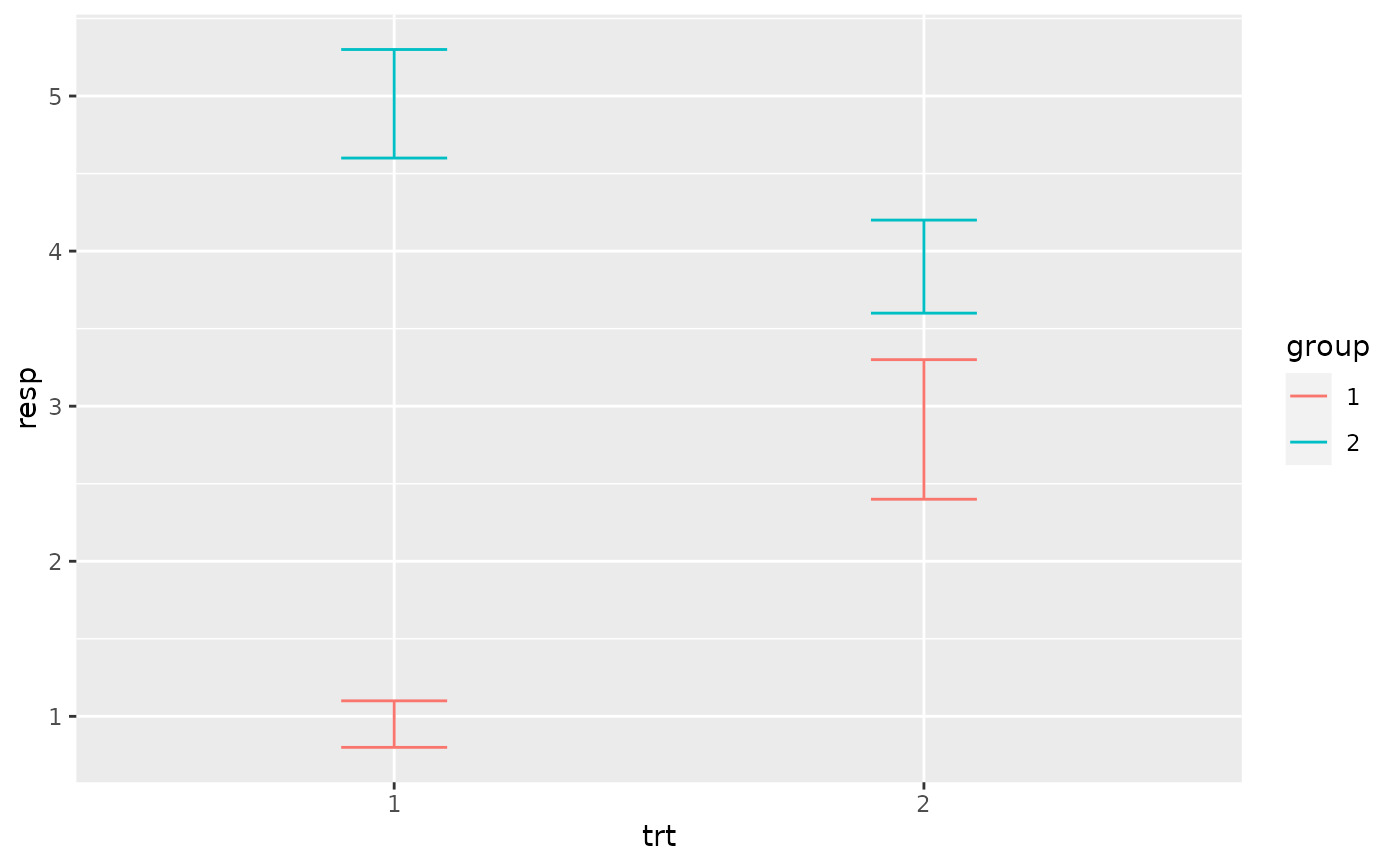 # Flip the orientation by changing mapping
ggplot(df, aes(resp, trt, colour = group)) +
geom_linerange(aes(xmin = lower, xmax = upper))
# Flip the orientation by changing mapping
ggplot(df, aes(resp, trt, colour = group)) +
geom_linerange(aes(xmin = lower, xmax = upper))
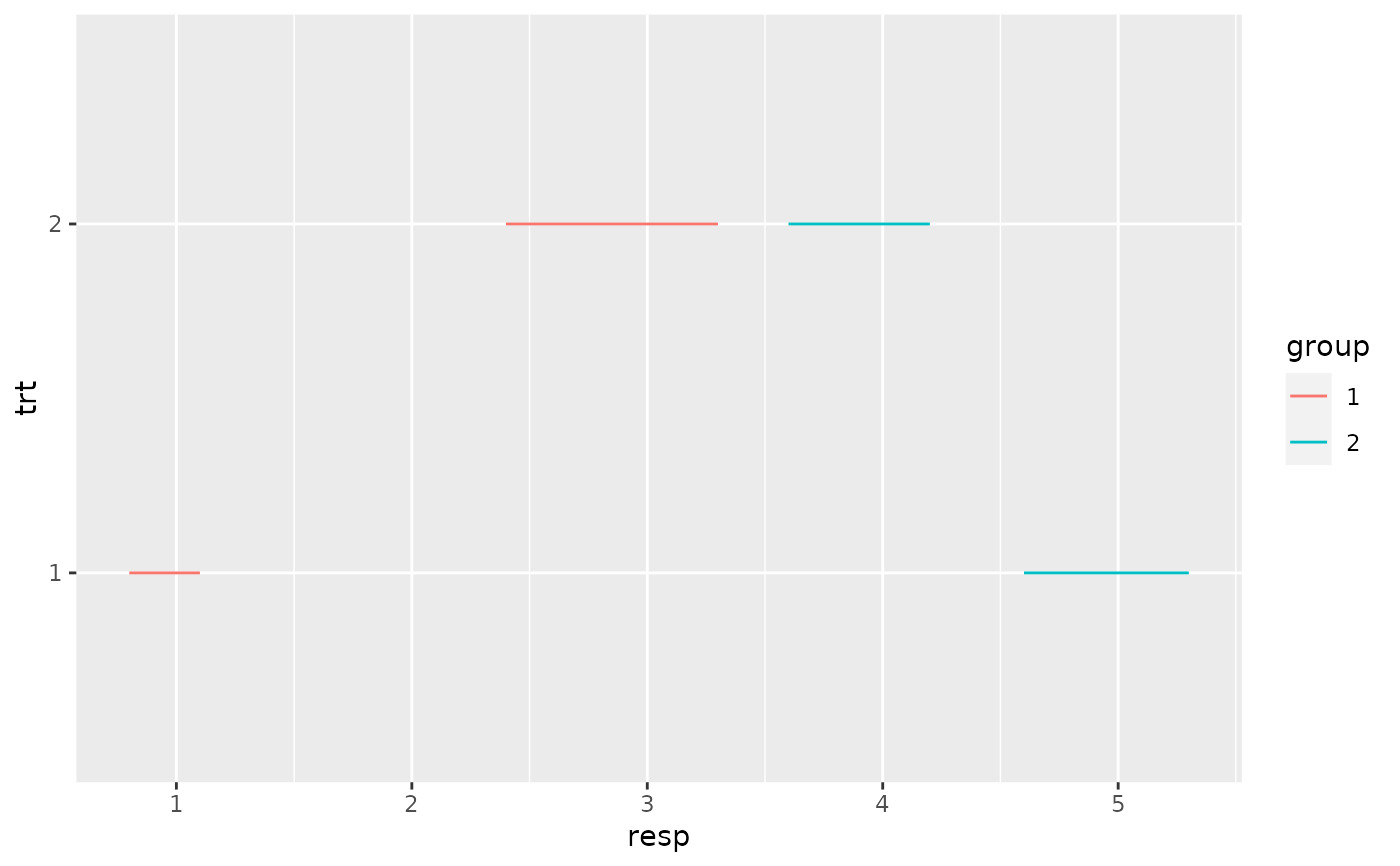 # Draw lines connecting group means
p +
geom_line(aes(group = group)) +
geom_errorbar(aes(ymin = lower, ymax = upper), width = 0.2)
# Draw lines connecting group means
p +
geom_line(aes(group = group)) +
geom_errorbar(aes(ymin = lower, ymax = upper), width = 0.2)
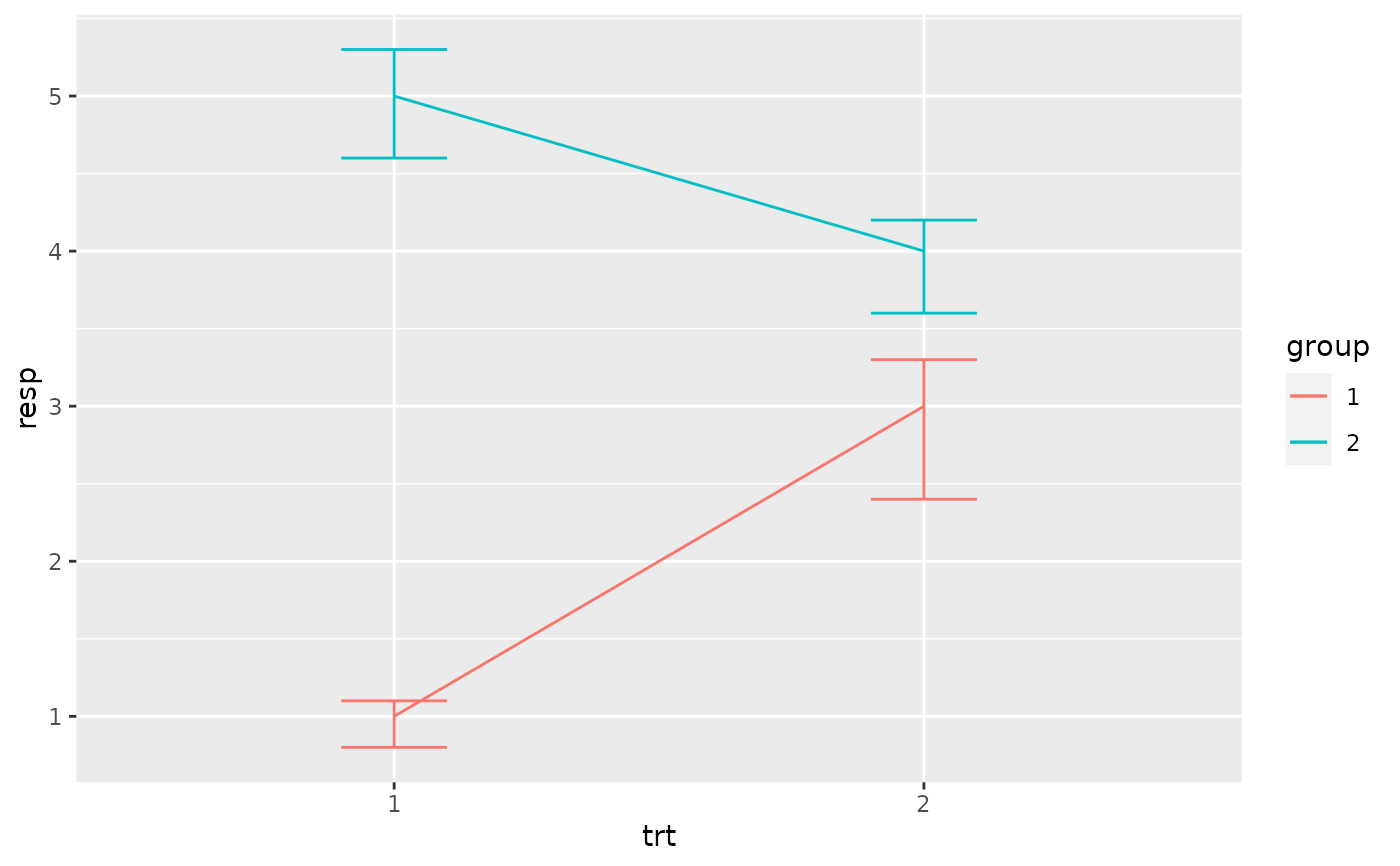 # If you want to dodge bars and errorbars, you need to manually
# specify the dodge width
p <- ggplot(df, aes(trt, resp, fill = group))
p +
geom_col(position = "dodge") +
geom_errorbar(aes(ymin = lower, ymax = upper), position = "dodge", width = 0.25)
# If you want to dodge bars and errorbars, you need to manually
# specify the dodge width
p <- ggplot(df, aes(trt, resp, fill = group))
p +
geom_col(position = "dodge") +
geom_errorbar(aes(ymin = lower, ymax = upper), position = "dodge", width = 0.25)
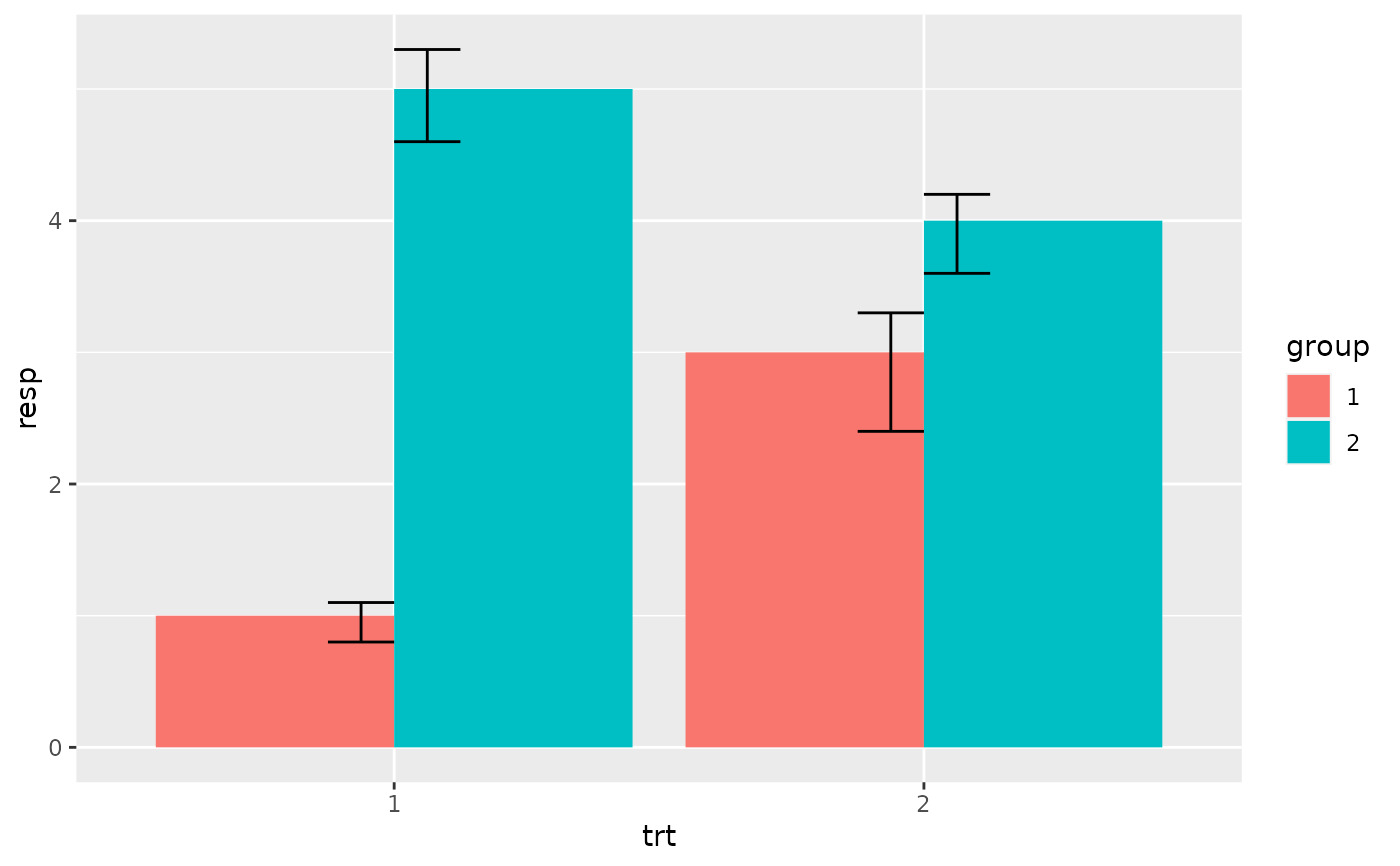 # Because the bars and errorbars have different widths
# we need to specify how wide the objects we are dodging are
dodge <- position_dodge(width=0.9)
p +
geom_col(position = dodge) +
geom_errorbar(aes(ymin = lower, ymax = upper), position = dodge, width = 0.25)
# Because the bars and errorbars have different widths
# we need to specify how wide the objects we are dodging are
dodge <- position_dodge(width=0.9)
p +
geom_col(position = dodge) +
geom_errorbar(aes(ymin = lower, ymax = upper), position = dodge, width = 0.25)
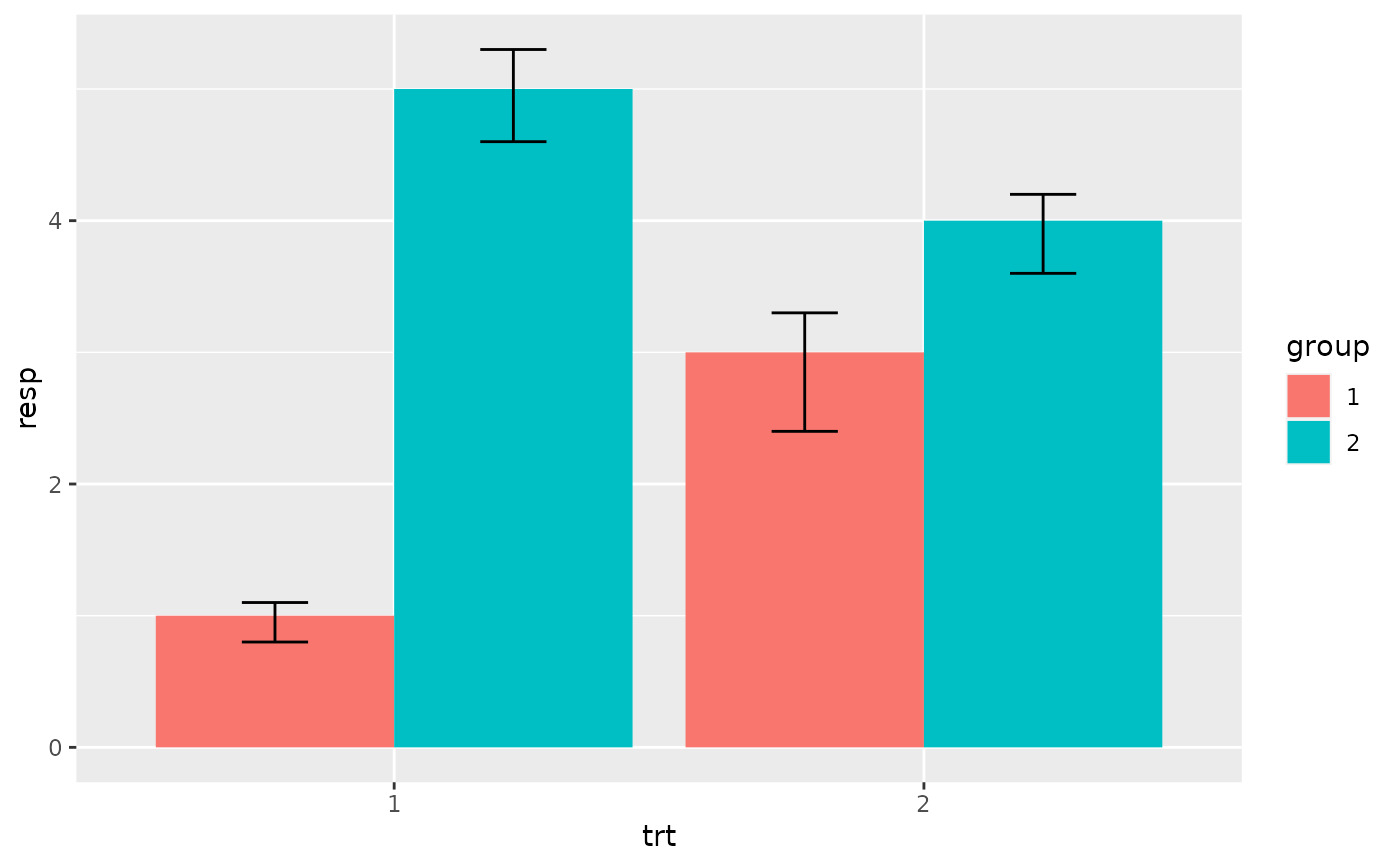 # When using geom_errorbar() with position_dodge2(), extra padding will be
# needed between the error bars to keep them aligned with the bars.
p +
geom_col(position = "dodge2") +
geom_errorbar(
aes(ymin = lower, ymax = upper),
position = position_dodge2(width = 0.5, padding = 0.5)
)
# When using geom_errorbar() with position_dodge2(), extra padding will be
# needed between the error bars to keep them aligned with the bars.
p +
geom_col(position = "dodge2") +
geom_errorbar(
aes(ymin = lower, ymax = upper),
position = position_dodge2(width = 0.5, padding = 0.5)
)
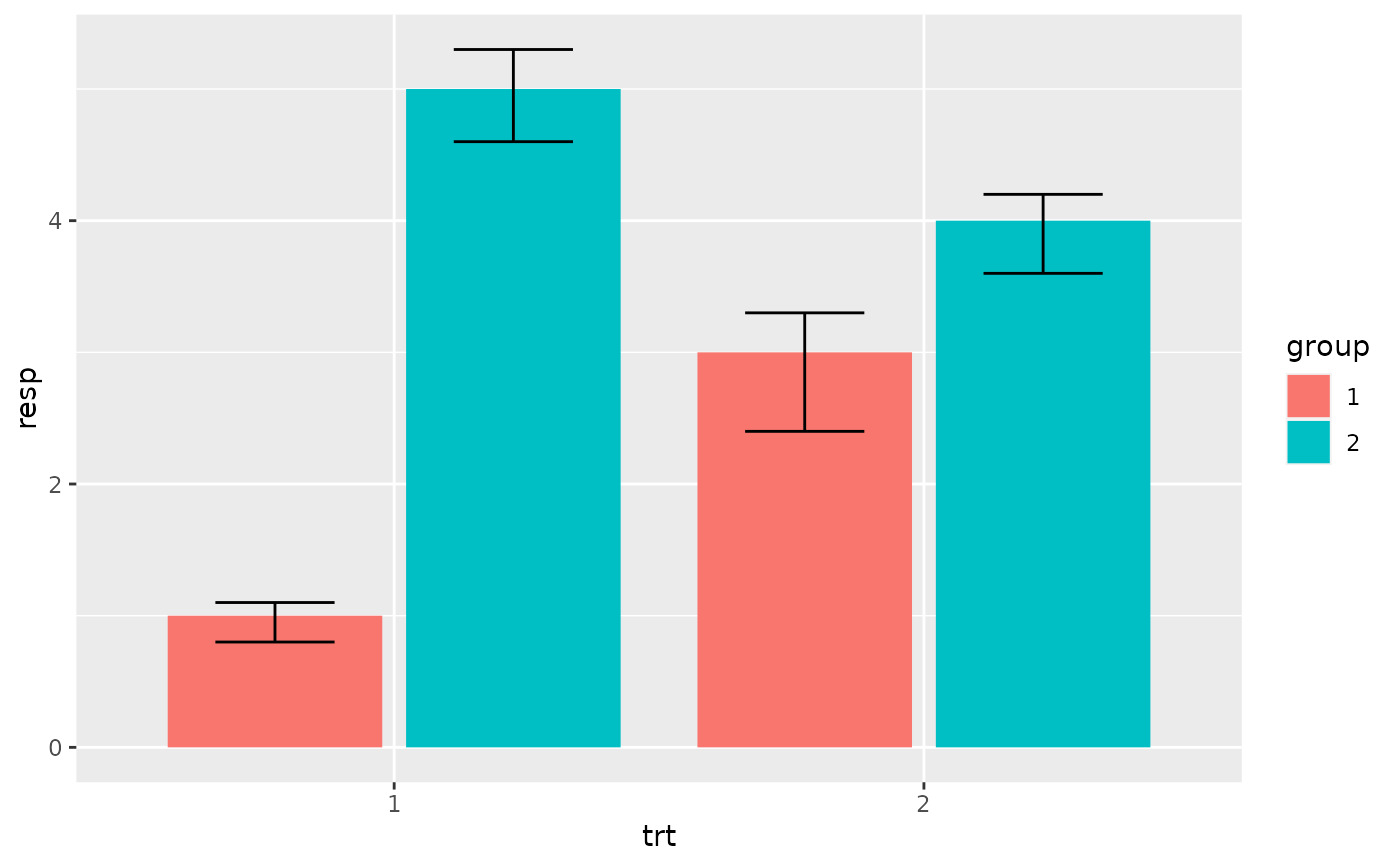
相關用法
- R ggplot2 geom_qq 分位數-分位數圖
- R ggplot2 geom_spoke 由位置、方向和距離參數化的線段
- R ggplot2 geom_quantile 分位數回歸
- R ggplot2 geom_text 文本
- R ggplot2 geom_ribbon 函數區和麵積圖
- R ggplot2 geom_boxplot 盒須圖(Tukey 風格)
- R ggplot2 geom_hex 二維箱計數的六邊形熱圖
- R ggplot2 geom_bar 條形圖
- R ggplot2 geom_bin_2d 二維 bin 計數熱圖
- R ggplot2 geom_jitter 抖動點
- R ggplot2 geom_point 積分
- R ggplot2 geom_blank 什麽也不畫
- R ggplot2 geom_path 連接觀察結果
- R ggplot2 geom_violin 小提琴情節
- R ggplot2 geom_dotplot 點圖
- R ggplot2 geom_errorbarh 水平誤差線
- R ggplot2 geom_function 將函數繪製為連續曲線
- R ggplot2 geom_polygon 多邊形
- R ggplot2 geom_histogram 直方圖和頻數多邊形
- R ggplot2 geom_tile 矩形
- R ggplot2 geom_segment 線段和曲線
- R ggplot2 geom_density_2d 二維密度估計的等值線
- R ggplot2 geom_map 參考Map中的多邊形
- R ggplot2 geom_density 平滑密度估計
- R ggplot2 geom_abline 參考線:水平、垂直和對角線
注:本文由純淨天空篩選整理自Hadley Wickham等大神的英文原創作品 Vertical intervals: lines, crossbars & errorbars。非經特殊聲明,原始代碼版權歸原作者所有,本譯文未經允許或授權,請勿轉載或複製。
